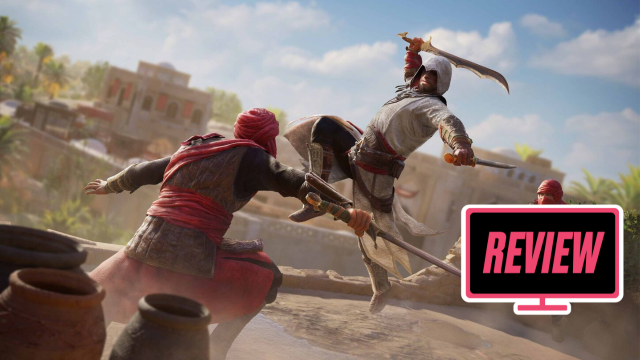There’s a moment late in Assassin’s Creed Mirage in which its protagonist, Basim, suggests to his mentor that a visit to an old friend might be helpful. She warns him not to let the reality of time passed cloud his judgment, and Basim promises that he won’t.
After a trilogy of exhaustingly long action RPGs set in game worlds covering entire countries, Mirage is a conscious return to Assassin’s Creed‘s roots. It’s a game with a campaign easily finishable in a weekend that is set in just one city. It also comes at a reduced price tag to better set expectations regarding its smaller scale compared to its immediate predecessors.
Cutting the bloat and favouring density over breadth are approaches that I applaud in AAA games in general, and I have been vocal about wanting this reduction of scale for the Assassin’s Creed series for years. I’ve wanted this despite growing so fatigued by the classic AC design framework that, at one point, I could no longer tell if I was even enjoying them anymore.
As I sit down to write this review, moments after Mirage’s credits have rolled, I once again find myself unsure if I’ve truly enjoyed the time I’ve invested.
B.O.B (Basim Over Baghdad)
Mirage’s representation of 9th-century Baghdad is truly wondrous. Even the creative choice to set the game in this particular place should, I think, be applauded. For the past 30+ years, the first thing the city’s name conjures in Western minds is probably the Gulf War and its encore. To see this city and its history depicted in all its beauty and detail, in a piece of major Western media, should be commended.
And I encourage you to walk the city and take it in, because Mirage’s free-running/parkour is still riddled with the same movement problems that have plagued the series forever. Basim will clamber around buildings and leap over gaps slightly more smoothly than his predecessors, but you’ll still never be able to make him flow through the environment quite the way Ubisoft intends. Parkour is one of those core elements of the franchise that has gotten incrementally better in each title, but it’s still kind of wild to me that after more than 15 Assassin’s Creed games, it still doesn’t fully work as it was always supposed to.
A much bigger headache: the decision to make the button that stealthily assassinates a target the same one that swings your sword. The button’s function is context sensitive, of course, but on countless occasions, in the nanosecond between the ‘assassinate’ prompt appearing and my finger tapping the right bumper, something would change and Basim would lunge wildly at his prey, alerting every guard in the area. Given the smoothness of the combat and his handy bag of ninja tricks, these situations were easy to resolve but did have the effect of making Basim feel like a big brutal idiot rather than the highly competent professional killer he is supposed to be.
The Comfort of Familiarity
Outside of his frequent bumbling, I found Basim to be one of the more charmless and forgettable AC protagonists. If you’ve played just about any Ubisoft action game since the PS360 era then you can already guess what his motivation and arc largely entail.
But that’s the rub here, isn’t it? Mirage may be a return to some of the granular design that defined the series’s first decade, but it’s still every bit constructed around the Ubisoft formula.
On paper, Mirage is everything I wanted the series to return to. The reality is that time has passed, and in that time, Ubisoft has released an absolute buttload of action games differentiated only by the aesthetics of their I.P.
We can talk about how a much less useful version of Liberation’s disguise system appears here. Or the small disappointment I felt that the upgradable home base system featured in many of the series’ instalments doesn’t return. I didn’t dwell on these details during my time with Mirage, though, because I was swept away in the sense of comfortable numbness that comes with the familiarity these games are designed to deliver.
There absolutely is a value to comfort blanket media. Likewise, there is also something to be said for the brain-buzz of ticking off an objectives checklist despite how hollow you know that accomplishment is. Hell, by this time next year I’ll probably be looking forward to the next Far Cry or Watch Dogs just as much as anybody. Beyond the comfort of familiarity, though, am I still truly having fun? Am I enjoying them? I honestly don’t know anymore.
For years, I told myself that I missed the old Assassin’s Creed, and Mirage is objectively a tight, polished, and well-crafted return to what the franchise used to be. It’s also so slavishly identical to the majority of what Ubisoft has released over the last 16 years that playing it is like rewatching a movie I liked (but didn’t love) in high school for the 25th time. It’s a neat enough way to turn my brain off and kill some time, but I can’t escape the constantly nagging thought: ‘What are we even doing here?’
Image: Ubisoft, Kotaku Australia

Leave a Reply